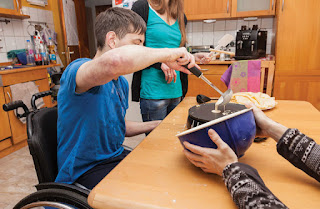Building Bridges to Independence: The Ultimate Adult Living Program Revealed
For individuals with disabilities, achieving independence is a lifelong journey filled with unique challenges and triumphs. Fortunately, specialized programs are designed to empower adults with disabilities and provide them with the skills, resources, and support they need to live fulfilling and independent lives.
In this article, we will explore the world of independent living programs for adults, uncovering the key components that bridge the gap between disability and independence. Join us as we reveal the ultimate adult living program and its transformative impact on individuals seeking to build their bridges to independence.
Understanding Independent Living Programs for Adults
A Holistic Approach: Nurturing Independence in All Aspects of Life
The foundation of an effective independent living program lies in its holistic approach. These programs recognize that independence extends beyond the physical realm and encompasses various aspects of life, including personal care, employment, housing, transportation, and social engagement. By addressing these areas comprehensively, individuals are equipped with the tools and support needed to navigate the complexities of adulthood.
Life Skills Training: Empowering Individuals for Everyday Living
The focus on life skills training is central to any successful independent living program. These programs offer various educational opportunities, teaching individuals essential skills such as personal hygiene, meal planning and preparation, financial management, time management, and effective communication. Empowering individuals with these practical skills gives them the confidence and competence to handle daily tasks independently.
Assistive Technology: Unleashing the Power of Accessibility
In today's digital age, assistive technology is crucial in fostering independence for individuals with disabilities. Independent living programs often provide training and access to assistive devices like screen readers, voice recognition software, mobility aids, and communication tools. These technologies break down barriers, enabling individuals to overcome challenges and fully participate in various aspects of life, including education, employment, and social interactions.
Vocational Training and Employment Support: Opening Doors to Economic Independence
Securing meaningful employment is a vital step toward independence for adults with disabilities. Independent living programs offer vocational training and employment support, including job readiness skills development, resume building, interview preparation, and job placement assistance. These programs empower individuals to achieve economic independence and pursue fulfilling careers by equipping them with the necessary skills and connecting them with employment opportunities.
Accessible Housing: Creating Safe and Inclusive Living Environments
A crucial aspect of independent living is access to safe and inclusive housing. Independent living programs work to ensure individuals have access to affordable, accessible housing options that accommodate their specific needs. This may include modifications such as wheelchair ramps, widened doorways, and accessible bathroom facilities. These programs create environments where individuals can thrive and live independently by providing suitable housing options.
Peer Support and Community Integration: Fostering Connection and Belonging
The journey to independence is not meant to be traveled alone. Independent living programs emphasize the importance of peer support and community integration. They facilitate opportunities for individuals to connect with others who share similar experiences, fostering a sense of belonging and providing a support network. Through group activities, workshops, and social events, individuals gain a sense of community and realize they are not alone on their path toward independence.
Advocacy and Rights Awareness: Empowering Individuals to Be Agents of Change
Independent living programs empower individuals with disabilities to become advocates for themselves and their community. These programs provide education on disability rights, self-advocacy training, and resources for individuals to navigate legal frameworks. By empowering individuals to understand their rights and encouraging them to speak up, these programs create a society that embraces inclusion, equality, and accessibility.
Conclusion
Independent living programs for adults with disabilities offer a transformative journey toward independence. Through a holistic approach encompassing life skills training, assistive technology, vocational training, accessible housing, peer support, and advocacy, these programs create bridges to independence for individuals seeking to lead fulfilling lives.
Whether learning daily life skills, securing employment, finding inclusive housing, fostering connections, or advocating for change, independent living programs provide the tools and support necessary to build a life filled with empowerment, autonomy, and joy.
Are you ready to embark on your journey toward independence? Join the Northeast Independent Living Program (NILP) today and unlock the possibilities that await you. Their comprehensive program offers life skills training, assistive technology, vocational support, accessible housing, peer connections, and advocacy resources to help you build a bridge to independence. Take the first step towards a more empowered and fulfilling life.


Comments
Post a Comment